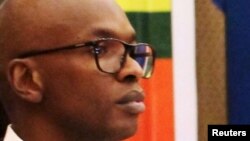Burundi’s foreign minister says it’s erroneous for people to conclude that the political and security challenges the East African country faces could lead to genocide similar to what Rwanda experienced in 1994.
The international community has expressed concern about the escalating violence in Burundi. The African Union has warned that if not resolved, the violence could create instability in the country and affect the region. The United Nations has said the country could plunge into civil war if the situation persists.
Meanwhile, international observers are monitoring Burundi as a presidential mandate takes effect, requiring Burundians to hand over any weapons they have or risk being considered "enemies of the nation." There is growing concern that President Pierre Nkurunziza's weapons ultimatum could set off widespread violence.
In an interview with VOA, Foreign Minister Alain Nyamitwe said the government in Bujumbura is aware of the concerns expressed by international community.
He said Burundi had recently experienced situations that are regrettable, but he warned against making comparisons to what happened in Rwanda.
“They have a tendency to compare with the situation which prevailed in Rwanda in 1994," Nyamitwe said. "We have to be very clear: There is no trend in Burundi that indicates that Burundi is heading to genocide in the scale or in the nature of what happened in Rwanda.
“Everybody is unanimous to recognize the fact that the conflict, if there is any conflict in the country, it has no ethnic tone. You have people who have opposed the president, and you have Hutus and Tutsis among them. You have people who have supported the president, and you have Hutus and Tutsis among them. So what we need to do is to calm down the situation vis-à-vis the way we address the population.”
Support for dialogue
Asked what the government is doing to calm the situation in Burundi, Nyamitwe said the administration is implementing measures to address the security challenges. He also said the government supports the inter-Burundian dialogue as part of the process to ease tension.
“We also have to make sure that the weapons that are illegally possessed by people should be surrendered, and that is exactly why maybe some of the statements were made calling upon the people who have the weapons to surrender them peacefully," Nyamitwe said. He noted that the two-month period for the weapons surrender had expired, but that the period had been extended by five days.
“We continue to believe that the people in Burundi need to live in peace and harmony — Hutus and Tutsis alike, because they belong to the same nation. ... We continue to think that Hutus and Tutsis will be part and parcel of the solution that we are calling for our country, now and in the days and months to come,” he said.
The U.N. Security Council plans to discuss the security situation in Burundi next week. This followed reports that the government is using state institutions, including the security officers, to crack down on opposition groups. The groups called for an international intervention to stop the violence, which they say could plunge the country into chaos.
Nyamitwe disagreed.
“We believe that there are institutions that are in place in the country which are in charge of solving the problems of the country. ... We believe that we are on track for better solutions to the situations that prevail in the country,” he said.
“I don’t think what we are going through warrants international intervention. ... Some of the [things] reported by the opposition circles have not been established by an independent investigation. One has to be very careful that some opposition groups might advance theories which are completely distorted and need to be established by an independent and credible investigation.”




